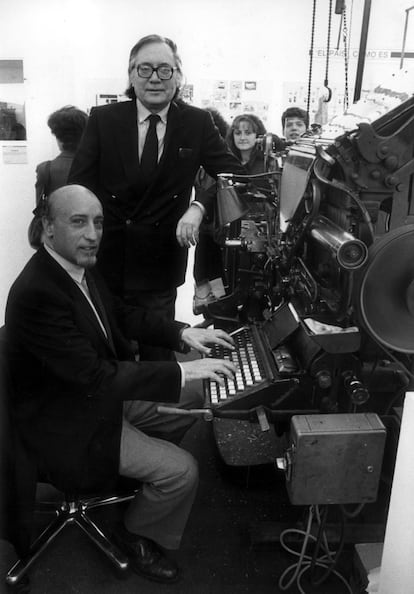Lyric poetry rides death

Strictly opinion pieces that reflect the author's own style. These opinion pieces must be based on verified data and be respectful of individuals, even if their actions are criticized. All opinion columns by individuals outside the EL PAÍS editorial team will include, after the last line, a byline—no matter how well-known—indicating the author's position, title, political affiliation (if applicable), or main occupation, or any that is or was related to the topic addressed.

I received a letter from María España, Francisco Umbral's widow , which reads as follows: "Dear Vicent: I am delighted to greet you and tell you that among the photos I took in the past, I found one of you in which you look as handsome as ever. It's a shame so many of our friends are no longer with us.
The latest edition of Mortal and Rosa has come out, which I will send you.
An article of yours appeared in El País a few days ago in which you quote Paco with admiration and affection. He loved you and admired you too. The truth is, you were an exceptional group of writers. And handsome too.
These affectionate words express a feeling that has brought me back to a past that, although today it seems gilded and frosted by time, includes an extraordinary book and the tragedy of the death of a son. I remember the time I ran into Umbral in the elevator at the Clínica de la Concepción. I was going to visit a friend who had heart surgery, and Umbral had her five-year-old son hospitalized there, suffering from leukemia. He was completely devastated. Without asking him anything, he told me he was beyond saving. He then mentioned a woman who, upon hearing about his case, approached him in the hospital hallway to comfort him and told him that God was infinitely merciful. Umbral replied: "Well, you're being a jerk to my son." The death of his son Pincho came to him while he was writing Mortal y Rosa , the book for which he will go down in history, so that death came between the lyrical and free angel that he had in each of his fingertips with which he joyfully pounded the Olivetti typewriter and the harsh, lyrical reality as it is.
The laughter of those nights at the Picardías restaurant, where we imagined the next issue of Hermano Lobo, was a long way behind us. Sharing the laughs between courses with Chumy Chúmez , Summers, Perich , Forges, and Ops, el Roto , was a privilege. During those after-dinner conversations, Umbral spoke deeply with a wicked irony; Cándido moved between Kant and the chestnut seller on the corner; José Luís Coll always found a way to twist the neck of a word. Among that whole group, only Umbral believed he would go down in history, and he was willing to do whatever it took to achieve it.
To go down in history, you must first become a character. It's not enough to write, paint, dance, sing, run, and make people laugh better than anyone else. You need to imbue your persona with an aura that turns you into your own ghost. Ramón Gómez de la Serna read articles aloud from a trapeze artist's swing or on the back of an elephant in the Price circus; González Ruano had staged a spectacle of himself with long, pearly nails to hide a dark past; Camilo José Cela tried to impress by spouting zany Carpetovetonic antics, which in the end didn't even frighten the cloistered nuns; Josep Pla imagined himself a cosmopolitan peasant and alternated a bow tie with a beret; Francisco Umbral wore that red scarf that he draped down the length of his fitted black velvet coat, with which he dressed himself in Baudelaire, Marcel Proust, or Oscar Wilde, depending on the season's fashion.
He wanted to be a writer inside and out. He spent half his day nurturing his image and the other half destroying it. But posterity is fickle. It may happen that Umbral, after having made the Spanish language dance like no one else, having poured himself into thousands of articles, having dictated the fashion of journalism, may go down in history for having said: "I came to talk about my book," a bland phrase repeated today by everyone from politicians to bishops, from bankers to any snob. You won't go down in history if you don't become a source of anecdotes that will make your work forgotten.
Francisco Umbral wanted to demonstrate that in literature everything is permissible, nothing is good or bad, as long as it's well written. Umbral's first qualitative leap came when Vergés, at Delibes's urging, opened the pages of the magazine Destino to him, where Josep Pla, Perucho, Álvaro Cunqueiro, and Néstor Luján had set the bar for censored journalism very high. Umbral measured himself against them without a disadvantage. There was a second leap when Juan Luis Cebrián, the director of the recently founded newspaper EL PAÍS, called him to write a social chronicle. It was the journalistic and literary success of the Transition.
He created a champagne-filled, bubbly, high-literary-style social chronicle, with an admirable freedom and lack of respect for language, urban forms, and politics. Umbral would arrive at any party disguised as a writer, and people would speak to him in phrases tailored to his needs, hoping to be quoted with their name in bold the next day. Then the hatred of the political factions in the media arrived, and everything went to hell. I open the book Mortal y Rosa and read: "To have finally bitten the broken cry of your life . " And I see death riding the lyric.

Writer and journalist. Winner of the Alfaguara and Nadal novel prizes, among others. He began his career as a journalist at the newspaper 'Madrid' and the magazines 'Hermano Lobo' and 'Triunfo'. He joined EL PAÍS as a parliamentary columnist. Since then, he has published articles, travelogues, reports, and daguerreotypes of various personalities.
EL PAÍS

%3Aformat(jpg)%3Aquality(99)%3Awatermark(f.elconfidencial.com%2Ffile%2Fbae%2Feea%2Ffde%2Fbaeeeafde1b3229287b0c008f7602058.png%2C0%2C275%2C1)%2Ff.elconfidencial.com%2Foriginal%2F6a5%2F008%2Fbed%2F6a5008bed0f4d3d6ecd52d3332e3cf92.jpg&w=3840&q=100)



